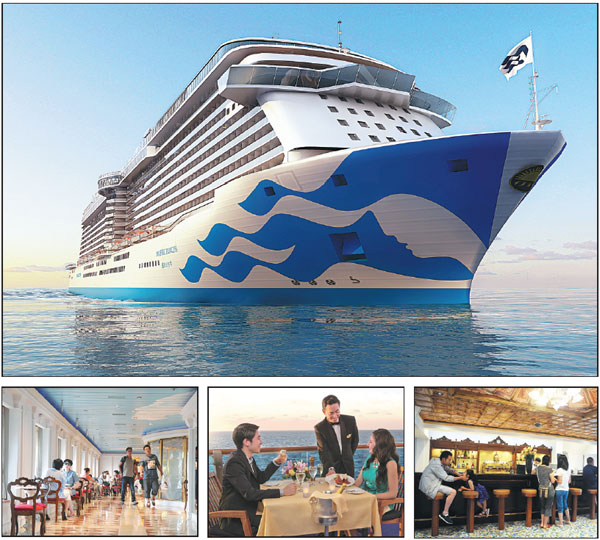'Golden' age for cruises
Industry show in Tianjin celebrates the potential for new experiences in the next decade, Xu Lin reports.
Cruise travel, already growing in popularity among Chinese with disposable income, will enjoy a boom over the next decade, according to industry experts at a recent trade show.
A growing number of Chinese travelers are enjoying cruises as a leisurely way of travel, relaxing as they enjoy delicious cuisine, activities on board and hospitality from an international service team.
"China's cruise industry will develop even faster in the next decade, entering into its golden period," says Zheng Weihang, executive vice-chairman and secretary-general of the China Cruise and Yacht Industry Association, at the recent China Cruise Shipping and International Cruise Expo in Tianjin. Cruise company executives, travel agency representatives and government officials participated in the show.
|
Top: A new cruise ship, Majestic Princess, owned by the global cruise company Carnival Corporation, will arrive in Shanghai in July. Above: Travelers enjoy activities on board. Photos by Xu Lin / China Daily and Provided to China Daily |
Over the past 10 years, the number of cruise ships that operate in China has increased from one in 2006 to 18. International cruise ports in China have grown from zero to seven, with three under construction. It's estimated that 1.6 million Chinese will travel overseas on a cruise this year.
"Many Chinese travelers still think cruises are only a type of transport. It's important to make them realize that cruises are also destinations, and they can spend more time on board," says Zheng.
The central government, Shanghai, Tianjin, and Hainan and Fujian provinces have introduced policies to boost development of the cruise industry, he says, and more domestic corporations are teaming up with cruise companies to provide shipbuilding, operation and talent training.
Many overseas cruises have adapted to cater to the demands of Chinese customers eager to enjoy themselves with friends or families. Chinese travelers can have a square dance or play mahjong. Also, cruises are hiring Chinese crews and teaching simple Chinese to foreign crews.
"As a growing number of international cruise brands enter China, the market needs a brand that can combine local features with the international elements," Fan Min, vice-chairman of Ctrip and chairman of Skysea Cruise Line says.
"It's the best time for domestic cruise companies like us as the market is mature. We have the local teams that know more about the China market."
Skysea's investors include the Chinese online travel agency Ctrip and the US-based Royal Caribbean Cruises Ltd, which operate the cruises together. The company is planning to have a second ship in China.
Meanwhile, overseas cruise companies have been cooperating with Chinese travel agencies to open up the market and attract tourists.
Fan says traditional travel agencies have pioneered the cruise economy, by chartering a cruise and selling tickets to travelers. Online travel agencies also follow this pattern in China and their share in the cruise-sales market is rising.
Fan is confident about online travel agencies' role in the market and thinks they will help connect with young travelers who might enjoy cruises.
Liu Zinan, president of the China and North Asia Pacific region for Royal Caribbean International, agrees that such charters help boost the cruise market in China. Most of Royal Caribbean's sales are via travel agencies, but the company is striving to expand other channels while maintaining this wholesale model.
As onshore tours organized by travel agencies are mainly for shopping, Liu says those who want to experience something different can join guided onshore tours offered by the cruise company.
The cruise association's Zheng calls for more ports to open in Asia, noting that the cruise itineraries starting from China are limited.
Wei Tao, chairman of Diamond Cruise International Co, Ltd, says his company plans to have a cruise leaving from a Japanese homeport for Shanghai, to draw Japanese tourists to China.
"Cruise tourism in China should have both inbound and outbound tourists. It should not just about transporting Chinese guests to Japan, South Korea and Southeast Asia," Zheng says.
Zheng suggests that global cruise companies open more cruise lines that go around the world, or that they first transport overseas tourists to China by air and then have them tour around China and other Asian countries on cruises.
"In the rapid growth of cruise tourism, quality also counts. Operators in the industry should ensure the good quality of a cruise experience, and avoid malicious low-price competition."
Contact the writer at xulin@chinadaily.com.cn



















